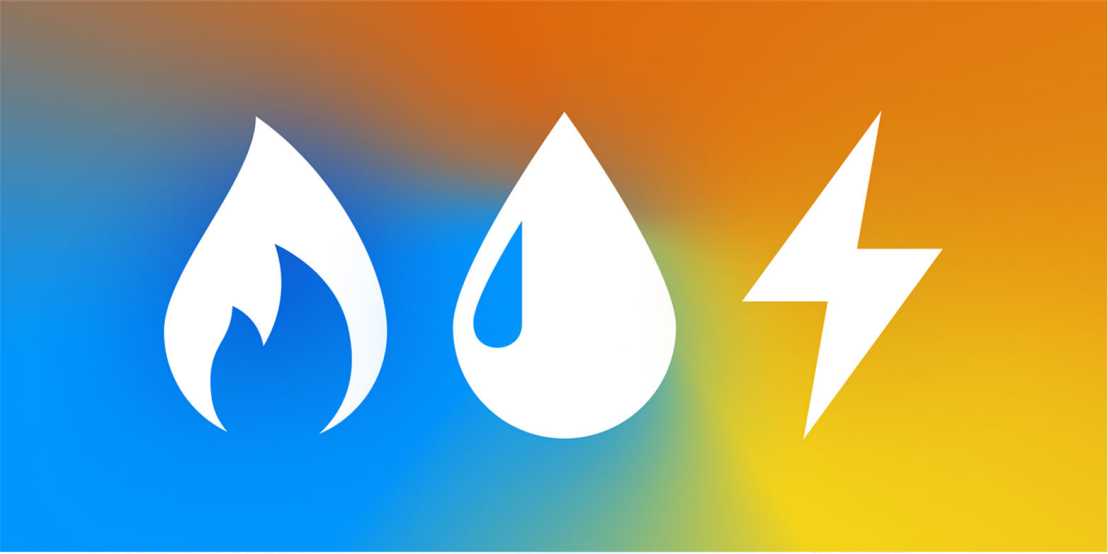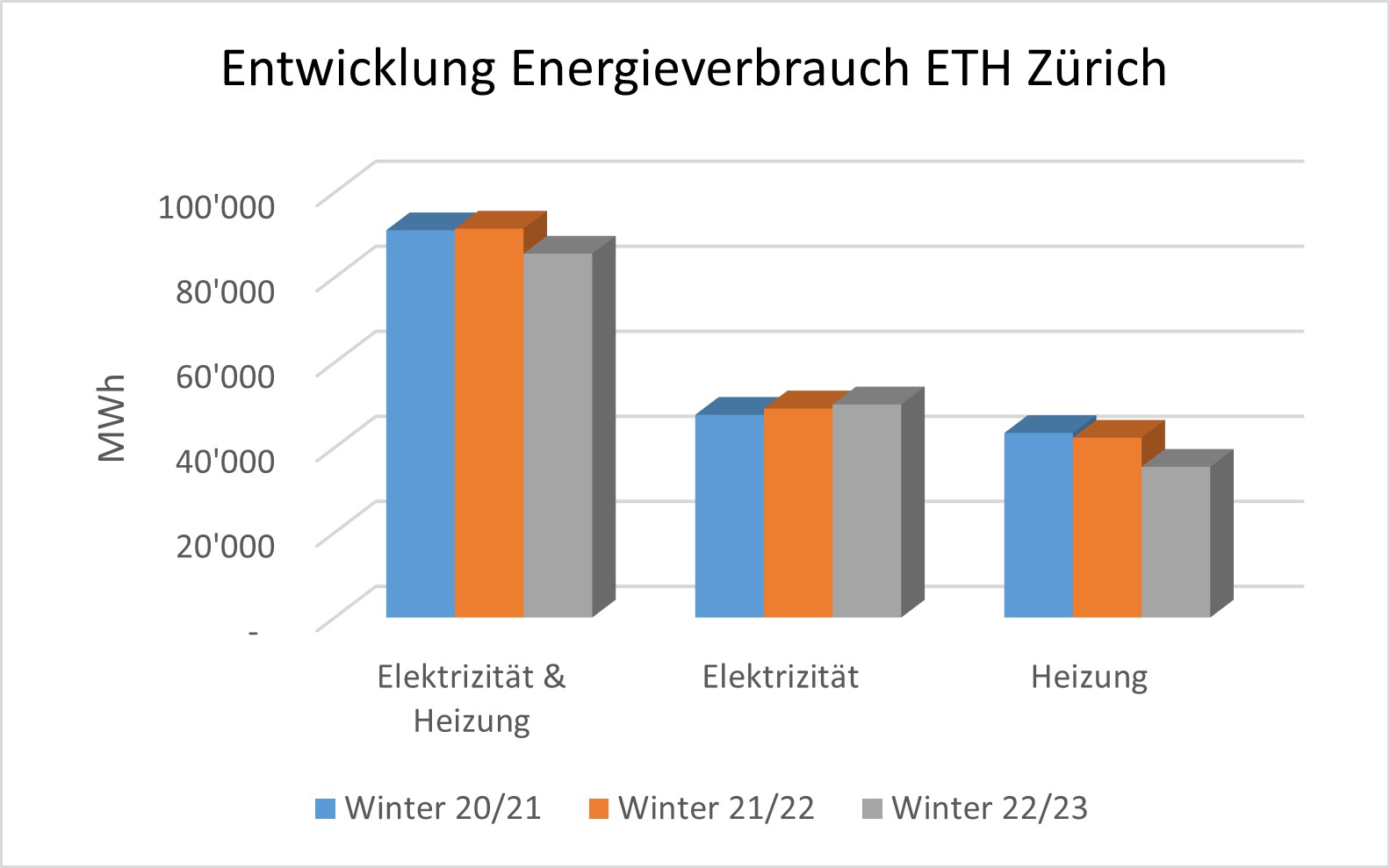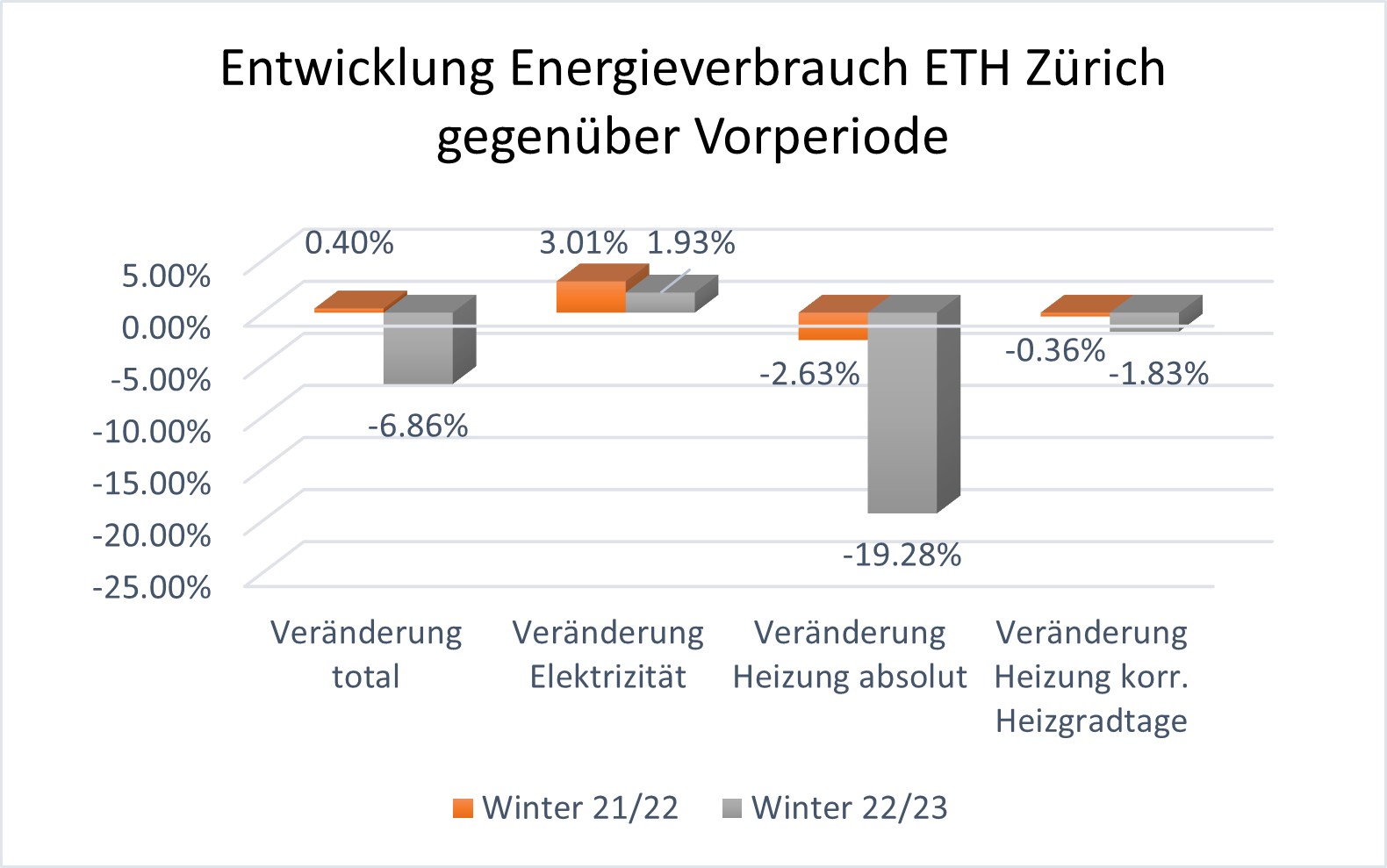Results and outlook for ETH Zurich’s energy supplies
In winter 2022/23, ETH Zurich reduced its energy consumption by around 7 percent compared to the previous winter and met the federal government’s gas savings target. As there is still some uncertainty surrounding energy supplies, it plans on reintroducing its energy-saving measures next winter. Specific measures for research are currently being worked on.

In winter 2022/23, ETH Zurich contributed to the prevention of an energy shortage and consumed less energy overall compared to previous years (cf. Graph 2). It reduced its energy consumption by almost 7 percent and reduced the amount of energy used for heating by over 19 percent (cf. Graph 3) compared to winter 2021/22. As regards gas, ETH Zurich was able to reduce its consumption by 30 percent compared to the previous five winters (cf. Graph 1).
As such, it was able to meet the goal set by the Federal Council for Switzerland to voluntarily reduce its gas consumption by 15 percent in comparison to the previous five years between October 2022 and March 2023, and for the federal government to set a good example in order to guarantee the energy supply in winter and prevent a gas shortage (cf. external page Press release of the Federal Council dated 24 August 2022). According to the Federal Council, the gas savings target was exceeded across Switzerland.

A mild winter resulted in lower consumption
The drop in heating energy consumption is partly thanks to the mild winter that Switzerland experienced this year. If the consumption is adjusted for the heating degree, then the energy consumption for heating at ETH decreased by around 1.8 percent compared to the previous winter. The heating degree days are an established measure that is used to calculate how much energy is needed for heating. With regard to heating energy consumption, it is also important to remember that ETH Zurich – like 60 percent of the 800 operators of dual-fuel installations in Switzerland – followed the recommendations of the Federal Council and temporarily switched its dual-fuel installations from gas to heating oil.
In the coldest weeks in December and January, when ETH’s heating energy consumption reached levels comparable to 2020, its heating oil consumption increased. From October to November and February to April, ETH consumed less heating energy than in previous winters (cf. Graph 1 & 2).

“With regards to ETH Zurich’s zero net goals, natural gas was only replaced with heating oil in order to prevent a possible gas shortage. In the long-term, ETH Zurich is committed to setting up its energy consumption so that it is climate-neutral by 2030,” explains Dario D’Ercole, Head of the Energy Shortage Task Force.

Supply guaranteed, energy-saving measures in place until the end of the heating season
Electricity, gas and oil supplies were guaranteed throughout the heating season despite the strained situation (cf. external page Energy Dashboard Switzerland). “Overall, the energy-saving measures implemented by ETH Zurich from October 2022 worked,” Dario D’Ercole continues. Some of the measures included reducing room temperatures throughout ETH to 20 degrees Celsius and keeping non-safety-related lighting to a minimum until the end of the heating season. As a general rule, the heating season in Switzerland lasts from mid-September to mid-May, as the cooler and wetter weather in April and May can extend the heating season.
Hot water back since April
Due to the more relaxed supply situation and in support of the many sports enthusiasts, ETH switched back on the hot water supply, which had been shut off over winter, at the start of April. “Based on what we know today, we assume that ETH Zurich will implement the energy-saving measures for heating, lighting and hot water used this winter next winter too,” says Dario D’Ercole. For its part, the Energy Shortage Task Force will continue to observe developments in the energy sector and so will be able to react quickly if the situation deteriorates again.
With regards to the coming winter, the Federal Council, cantons and energy industry recommended in April that any energy-saving efforts employed this winter should continue to be implemented and optimised for next winter to prevent an energy shortage in view of the uncertain situation surrounding energy supplies (cf. external page Press release of the Federal Council dated 20 April 2023).
What happens next?
The Energy Shortage Task Force and the Infrastructure Division (VPIN) do not currently have any energy-saving measures planned for summer to help prevent a possible energy shortage. ETH’s gas needs are lower in summer because it almost exclusively uses gas to heat its facilities. Normally, electricity supplies are not at risk in summer in Switzerland as the country usually produces enough electricity to meet its needs, and consumption is generally lower. In terms of electricity consumption, ETH Zurich was able to slow down its increase: instead of a rise of around 3 percent as in winter 2021/22, during winter 2022/23, electricity consumption increased by less than 2 percent (cf. Graph 2). This is partly against the background of rising student and staff numbers.
Accordingly, the Energy Shortage Task Force is working with ETH researchers on ways to save energy (electricity) and increase the operational reliability of the ETH Zurich infrastructure in the event of a blackout.
The task force is starting by focusing on the departments and technology platforms at ETH Zurich that use the most energy. This project is based on the energy and electricity savings targets of ETH Zurich for 2023 that were set out by ETH President Joël Mesot and ETH Vice President Ulrich Weidmann on 2 February 2023 during a virtual information event for ETH executives (cf. “Electricity and energy savings targets 2023” recording).
Cost-saving energy procurement
Faced with higher gas and electricity prices, the task force is reviewing the procurement strategy for all energy sources and working out appropriate solutions together with the Executive Board: “We want to further reduce price risks and be able to absorb price variations even better,” explains Dario D’Ercole. “We are working on the assumption that energy prices will go up again next winter.” When purchasing electricity, structured procurement resulted in ETH’s electricity costs doubling, but they did not increase nearly as much as they would have had ETH purchased the electricity at market prices as was the case with other market participants with a less far-sighted procurement strategy.
Accordingly, ETH is seeking to reorganise its gas procurement in such a way that daily price fluctuations can be cushioned and the cost consequences for the university minimised. In the future, ETH wants to purchase a fixed quantity of gas for a precisely defined time frame (so-called gas winter band).
Further information
Save Energy - Energy supplies during gas and electricity shortagesAlways up to date
Would you like to always receive the most important internal information and news from ETH Zurich? Then subscribe to the "internal news" newsletter and visit Staffnet, the information portal for ETH employees.